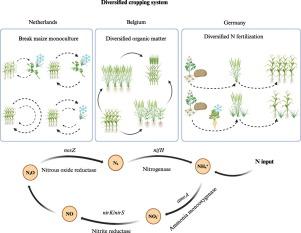当前位置:
X-MOL 学术
›
Sci. Total Environ.
›
论文详情
Our official English website, www.x-mol.net, welcomes your feedback! (Note: you will need to create a separate account there.)
Impact of diversified cropping systems and fertilization strategies on soil microbial abundance and functional potentials for nitrogen cycling
Science of the Total Environment ( IF 9.8 ) Pub Date : 2024-05-07 , DOI: 10.1016/j.scitotenv.2024.172954 Bei Liu , Hauke Ahnemann , Donatienne Arlotti , Bruno Huyghebaert , Fogelina Cuperus , Christoph C. Tebbe
Science of the Total Environment ( IF 9.8 ) Pub Date : 2024-05-07 , DOI: 10.1016/j.scitotenv.2024.172954 Bei Liu , Hauke Ahnemann , Donatienne Arlotti , Bruno Huyghebaert , Fogelina Cuperus , Christoph C. Tebbe

|
Diversified cropping systems and fertilization strategies were proposed to enhance the abundance and diversity of the soil microbiome, thereby stabilizing their beneficial services for maintaining soil fertility and supporting plant growth. Here, we assessed across three different long-term field experiments in Europe (Netherlands, Belgium, Northern Germany) whether diversified cropping systems and fertilization strategies also affect their functional gene abundance. Soil DNA was analyzed by quantitative PCR for quantifying bacteria, archaea and fungi as well as functional genes related to nitrogen (N) transformations; including bacterial and archaeal nitrification (), three steps of the denitrification process (, and ) and N assimilation (), respectively. Crop diversification and fertilization strategies generally enhanced soil total carbon (C), N and microbial abundance, but with variation between sites. Overall effects of diversified cropping systems and fertilization strategies on functional genes were much stronger than on the abundance of bacteria, archaea and fungi. The legume-based cropping systems showed great potential not only in stimulating the growth of N-fixing microorganisms but also in boosting downstream functional potentials for N cycling. The sorghum-based intercropping system suppressed soil ammonia oxidizing prokaryotes. N fertilization reduced the abundance of nitrifiers and denitrifiers except for ammonia-oxidizing bacteria, while the application of the synthetic nitrification inhibitor DMPP combined with mineral N reduced growth of both ammonia-oxidizing bacteria and archaea. In conclusion, this study demonstrates a strong impact of diversified agricultural practices on the soil microbiome and their functional potentials mediating N transformations.
中文翻译:

多样化耕作制度和施肥策略对土壤微生物丰度和氮循环功能潜力的影响
提出了多样化的种植制度和施肥策略,以提高土壤微生物组的丰度和多样性,从而稳定其对维持土壤肥力和支持植物生长的有益服务。在这里,我们通过欧洲(荷兰、比利时、德国北部)的三个不同的长期田间实验评估了多样化的种植系统和施肥策略是否也会影响其功能基因丰度。通过定量 PCR 对土壤 DNA 进行分析,以定量细菌、古细菌和真菌以及与氮 (N) 转化相关的功能基因;分别包括细菌和古细菌的硝化作用()、反硝化过程(、)和氮同化()三个步骤。作物多样化和施肥策略通常会提高土壤总碳(C)、氮和微生物丰度,但各地点之间存在差异。多样化种植制度和施肥策略对功能基因的总体影响远强于对细菌、古细菌和真菌丰度的影响。以豆类为基础的种植系统不仅在刺激固氮微生物的生长方面显示出巨大的潜力,而且在提高氮循环下游功能潜力方面也显示出巨大的潜力。以高粱为基础的间作系统抑制了土壤氨氧化原核生物。施氮肥降低了除氨氧化细菌外的硝化细菌和反硝化细菌的丰度,而合成硝化抑制剂DMPP与矿物氮的结合使用则减少了氨氧化细菌和古细菌的生长。 总之,本研究证明了多样化农业实践对土壤微生物组及其介导氮转化的功能潜力的强烈影响。
更新日期:2024-05-07
中文翻译:

多样化耕作制度和施肥策略对土壤微生物丰度和氮循环功能潜力的影响
提出了多样化的种植制度和施肥策略,以提高土壤微生物组的丰度和多样性,从而稳定其对维持土壤肥力和支持植物生长的有益服务。在这里,我们通过欧洲(荷兰、比利时、德国北部)的三个不同的长期田间实验评估了多样化的种植系统和施肥策略是否也会影响其功能基因丰度。通过定量 PCR 对土壤 DNA 进行分析,以定量细菌、古细菌和真菌以及与氮 (N) 转化相关的功能基因;分别包括细菌和古细菌的硝化作用()、反硝化过程(、)和氮同化()三个步骤。作物多样化和施肥策略通常会提高土壤总碳(C)、氮和微生物丰度,但各地点之间存在差异。多样化种植制度和施肥策略对功能基因的总体影响远强于对细菌、古细菌和真菌丰度的影响。以豆类为基础的种植系统不仅在刺激固氮微生物的生长方面显示出巨大的潜力,而且在提高氮循环下游功能潜力方面也显示出巨大的潜力。以高粱为基础的间作系统抑制了土壤氨氧化原核生物。施氮肥降低了除氨氧化细菌外的硝化细菌和反硝化细菌的丰度,而合成硝化抑制剂DMPP与矿物氮的结合使用则减少了氨氧化细菌和古细菌的生长。 总之,本研究证明了多样化农业实践对土壤微生物组及其介导氮转化的功能潜力的强烈影响。






























 京公网安备 11010802027423号
京公网安备 11010802027423号